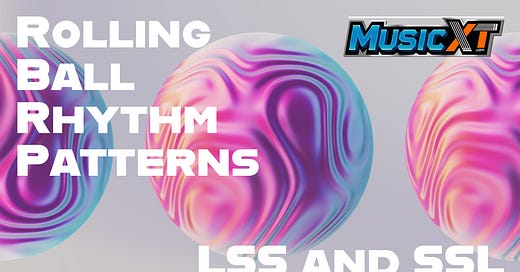One of my Dalcroze Heroes, Ruth Alperson, said something profound. She said something to the effect of “a good Dalcroze lesson is like taking a musical concept and giving the students a bath in it.” I interpreted that to mean there are multiple modalities and approaches to one topic and we should immerse the students in as many as possible. When I teach the rhythm patterns “long short short” and “short short long” I have several ways to get them to internalize the difference between these sensations, and to get the students to hear them as a group. A good way to offer a visual representation of these patterns is with a “rolling ball.” In this post I’ll include a video of the rolling ball rhythm pattern activity and some tips for success! But first…
Housekeeping:
Did you pre-order my NEW BOOK yet? Don’t wait! Get the first pressing of the book and spread the word! Then sign up for our SHORT COURSE, covering all the concepts of the book and playing with the four included CARD DECKS.
See you next week at the Ohio MEA Conference and the following week at the Texas MEA Conference! Make sure you come and find me there and say hello!
Hey! You should upgrade your subscription to the TEAMM so that you can access all of the ARCHIVE of posts and join the TEAMM Meetings! It’s a great way to deepen your teaching practice and incorporate Dalcroze-style teaching!
From the Archive:
Meeting: Don't Talk So Much
If you’ve been following my work, you’ve heard of MUSIC DRIVEN CLASSROOM MANAGEMENT and more recently, my aspiration for BEAUTIFUL LESSONS, and I think one great way to get to our best teaching selves is to strive to TALK LESS and MAKE MORE MUSIC! On Monday Sept 23 at 7 PM, I’ll be holding the TEAMM Meeting on this subject, and more!
When I teach these rhythm patterns, I am really including four different patterns:
The two patterns on the left are essentially THE SAME pattern, just twice as fast/slow. Same for the patterns on the right. This is a great way to set up the children to hear faster patterns, essentially making the eighth-and-two-sixteenth version of the pattern a simple diminution of the same pattern.
When we practice with the rolling ball, it really forces the children to hear the DURATION of each note, instead of just the attack. They are required to account for the TIME SPACE ENERGY of each note, adjusting the momentum of the ball and the sensation it has on their body. We can practice this in many different formats.






